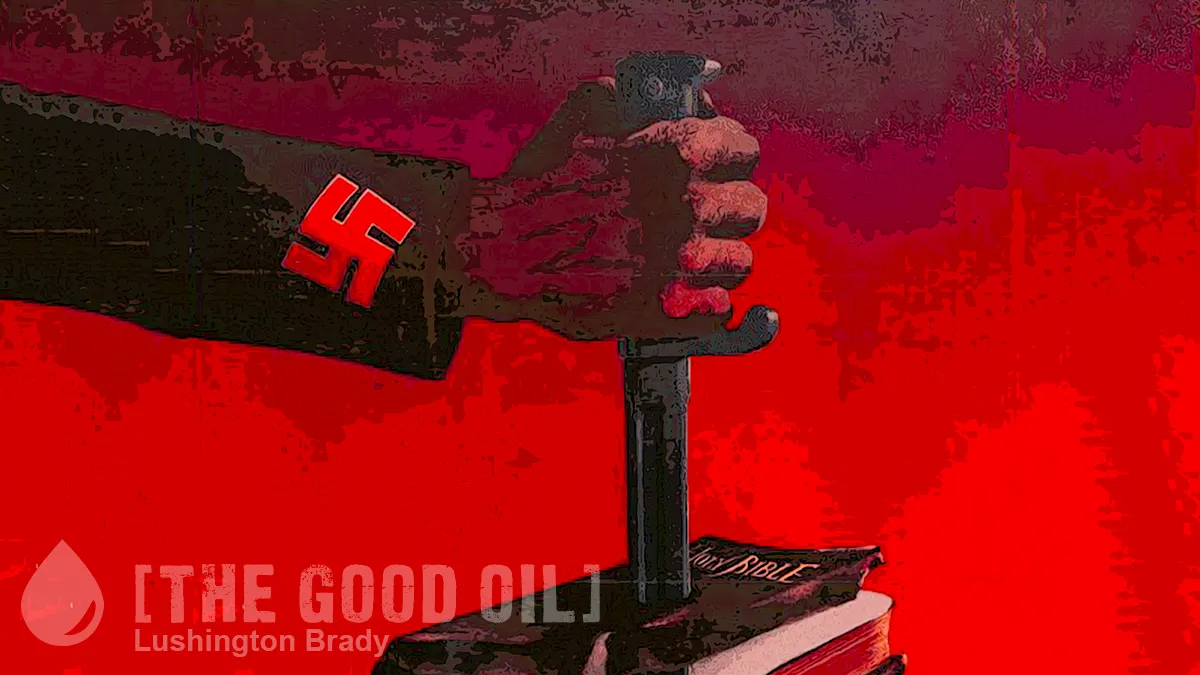Table of Contents
It’s interesting to compare the attitudes of chattering class socialists before and after WWII. Prior to WWII, many socialists and ‘progressives’ more or less admired fascism. After all, socialism and fascism shared much common ground, not least complete state control of all aspects of life.
While the Nazis were too obviously thuggish and gangster-like for many leftists, at least some leftist intellectuals backed even Hitler. In 1935, George Bernard Shaw, who had earlier proposed gas chambers for the ‘extraordinary number of people who I want to kill’, praised the ‘very intelligent gentleman named Adolf Hitler’. Don’t be frightened anymore about the Germans, Shaw finger-wagged, just a few short years before WWII erupted. Even in the early years of WWII, large swathes of the British left continued to oppose Britain’s participation. Ghandi’s Quit India Movement obstructed Britain’s War efforts, as did segments of the union movement in Australia.
That all turned on a dime the instant the death camps were liberated. Suddenly, no one wanted to be reminded that they had, however lukewarmly, supported the Nazis – or at least, didn’t want to oppose them. Eugenics, a popular ‘progressive’ ideology during the 1920s, as with Shaw’s plea for gas chambers, was suddenly very much not cool.
A massive and ongoing re-write of history began. First off, the banishment to the ‘far right’, then the denial that Nazis were in any way socialist.
But even better for the anti-Christian left: denounce the Nazis as Christian extremists.
This is perhaps the most damnable lie peddled by the secular, given how many Christians, clergy especially, were sentenced to the Nazis’ infamous concentration camps.
Neither Hitler nor the Nazi Party was remotely interested in preserving Christianity. Hitler was “happy” to “have no inner connection with [Catholicism]” and regularly mocked Christianity as a Jewish belief during the war.
The peddlers of the Nazi-Christian myth deliberately ignore just how cynically opportunist the Nazis were. While it’s possible to find out-of-context quotes that might be taken as indicating Hitler’s approval of Christianity, what the Nazi leader did tells the real story.
His relationship with the church can best be summarized by a statement he made in 1941: “I will not tolerate it, if a parson meddles in earthly affairs. The organized lie must be broken, so that the state is absolute lord.”
Joseph Goebbels also warned the churches that they would be tolerated only so long as they didn’t oppose the Nazi Reich.
Nazi leadership viewed orthodox Christianity as a competing religion, and treated it as such. Heinrich Himmler, who was in charge of the SS and famously dabbled in the occult, was recorded saying, “We shall not rest until we have rooted out Christianity.”
Himmler’s SS put their leader’s words into action.
The state seized most church property, ministers were routinely accused of financial misconduct or sexual perversion, para-church ministries and information outlets were eliminated and thousands of clergy arrested.
According to Baldur von Schirach, the Nazi leader of the German youth corps that would later be known as the Hitler Youth, '“the destruction of Christianity was explicitly recognized as a purpose of the National Socialist movement”' from the beginning, though '“considerations of expedience made it impossible”' for the movement to adopt this radical stance officially until it had consolidated power, the outline says.
This expedience, for instance, explains the oft-cited photo of a Wehrmact belt buckle adorned with the phrase Gott Mit Uns (‘God [is] with us’). This is not the knock-down argument the anti-Christian left think it is.
One of Hitler’s greatest obstacles throughout his rule was asserting unquestioned Nazi authority over the Wehrmacht. The officer corps, long associated with Prussian nobility, tended to distrust and look down on (safely behind his back) the upstart former corporal. For years, dissident Wehrmacht officers (however timidly and ineffectually) plotted the assassination of Hitler, culminating in the 20 July plot that nearly claimed the Nazi leader’s life.
So, the Nazis often had to accommodate German military tradition in order to mollify the snobbish officers. One of the long-standing traditions was the Gott Mit Uns motto.
Gott Mit Uns has a long tradition in German military history, having been used by the Teutonic Order and in the heraldry of the Prussian Army, and continued with all armies of unified Germany. Hitler didn’t put it on Wehrmacht uniforms, he just didn’t order it taken off.
Even so, Gott Mit Uns was not on all German army buckles. The SS, the elite military corps solely created and run by the Nazi Party, did not feature the motto on their buckles. Instead, SS buckles were inscribed, Meine Ehre Heisst Treue! (‘My Honor is Loyalty!’).
What about the Reichskonkordat, the first international treaty negotiated by the Nazis with the Catholic Church? For the Nazis, it was nothing more than a time-buying exercise with a competing foreign power, with whom it already had bitter relations. For the church, the treaty seemed an advantageous means of ensuring protection for Catholics from the Nazi machine.
“The new treaty was apparently entirely to the advantage of the church. In return for the retreat of German Catholicism from the political scene, the church was guaranteed, by international treaty, freedom for Catholic organizations [and] maintenance of denominational schools and youth education.”
All Hitler seemed to demand in return was “a pledge of loyalty by the clergy to the Reich government and a promise that Catholic religious instruction would emphasize the patriotic duties of the Christian citizen.” This posed no big problem for the church, the outline asserts. “Since it had always been the practice of the Catholic Church to abide by established governments and to promote patriotic convictions among the faithful, these stipulations of the Concordat were no more than legalizations of an existing custom.”
The church, like so many other world powers, fatally failed to grasp the brutal duplicity of the Nazi regime.
Of course, the churches stayed in Hitler’s good graces for only as long as the Nazis considered their cooperation expedient. Soon after Hitler assumed dictatorial powers, '“relations between the Nazi state and the church became progressively worse,'' the outline says. The Nazis '“took advantage of their subsequently increasing strength to violate every one of the Concordat’s provisions” […]
Once they had total power and set off to launch a world war, the Nazis made no secret of what lay in store for Christian clergymen who expressed dissent.
When the pope denounced the Nazi regime in 1937, the gloves were off.
Nazi street mobs, often in the company of the Gestapo, routinely stormed offices in Protestant and Catholic churches […] Munich, Nazi street gangs and a Gestapo squad attacked the residence of the Roman Catholic cardinal […]
Objectionable statements made by the clergy would no longer be prosecuted in the courts, the Nazis said. Statements “injurious to the State would be ruthlessly punished by ‘protective custody,’ that is, the concentration camp,” the outline says.
Anyone who tries to claim the Nazis were Christian is simply ignoring the brute facts of history.
But then, the left are good at doing that.









